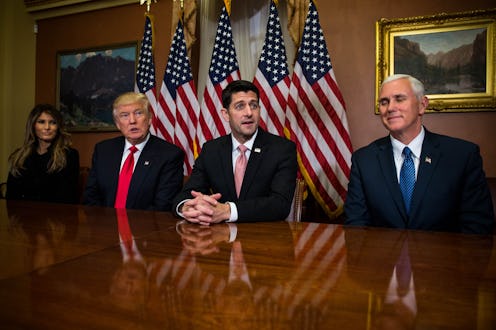News
Medicaid's Future Under Donald Trump And The GOP
It's been a week full of questions as the nation tries to imagine what changes a Donald Trump presidency will bring to the United States. A primary policy area of concern, especially with Republicans controlling both chambers of Congress as well as the White House, is health care — particularly for the 20 million Americans who have gained access through Obamacare. Twelve million of those who gained health insurance under the law are Medicaid recipients. What's going to happen to Medicaid under Trump and a GOP-dominated Congress? Don't expect it to disappear. But changes are likely.
Vice President-elect Mike Pence and Trump transition team Vice Chair Chris Christie, both governors, adopted Medicaid expansion in their states as provided for by Obamacare; governors in 31 states did so in all. Most Republicans understand that Medicaid is an important safety net program for children, seniors, and those living in poverty. But most GOP lawmakers in Congress are not down with the expansion, and many think there's a "Better Way" to run the program — that's the name of the health care plan advanced by House Speaker Paul Ryan and other prominent Republicans. A look at that plan, along with a health care bill that passed Congress but was vetoed by President Barack Obama in January, will give us an idea of what we might expect.
The bill included a provision to undo the Medicaid expansion enacted voluntarily by states under Obamacare, which brought 400,000 recipients into the program. The Better Way plan advocates issuing either federal block grants or per-capita allotments to states, ultimately reducing federal funding and leaving it to states to control health care spending. It also advocates implementing eligibility criteria for able-bodied recipients that requires them to be employed or actively seeking employment in order to receive coverage under the program. Trump's campaign site states that he supports the block grant idea for funding Medicaid at the state level, though no other details are provided.
That Republicans will make a move on health care, including Medicaid revamping, in 2017 is pretty much a sure bet. Ryan was champing at the bit after the bill passed Congress in January, stating, "We have now shown that there is a clear path to repealing Obamacare without 60 votes in the Senate. So, next year, if we’re sending this bill to a Republican president, it will get signed into law. Obamacare will be gone." The 60 votes he was referring to are the ones needed to overcome a filibuster by Senate Democrats. But GOP senators were able to avoid a filibuster by employing "reconciliation" rules, which limit debate time for pieces of legislation concerning taxes, spending, and federal debt. Don't be surprised if they do the same in 2017, as there will be no shortage of Democratic senators eager to protect Obamacare.
As millions of Americans bite their nails wondering if their health care access will disappear or be significantly reduced in the coming years, Congressional Republicans are brimming with excitement over the new political landscape more conducive to their agenda. Medicaid as a program will still exist, but funding will likely be reduced, and recipients may have to jump through some hurdles to remain eligible for coverage.
